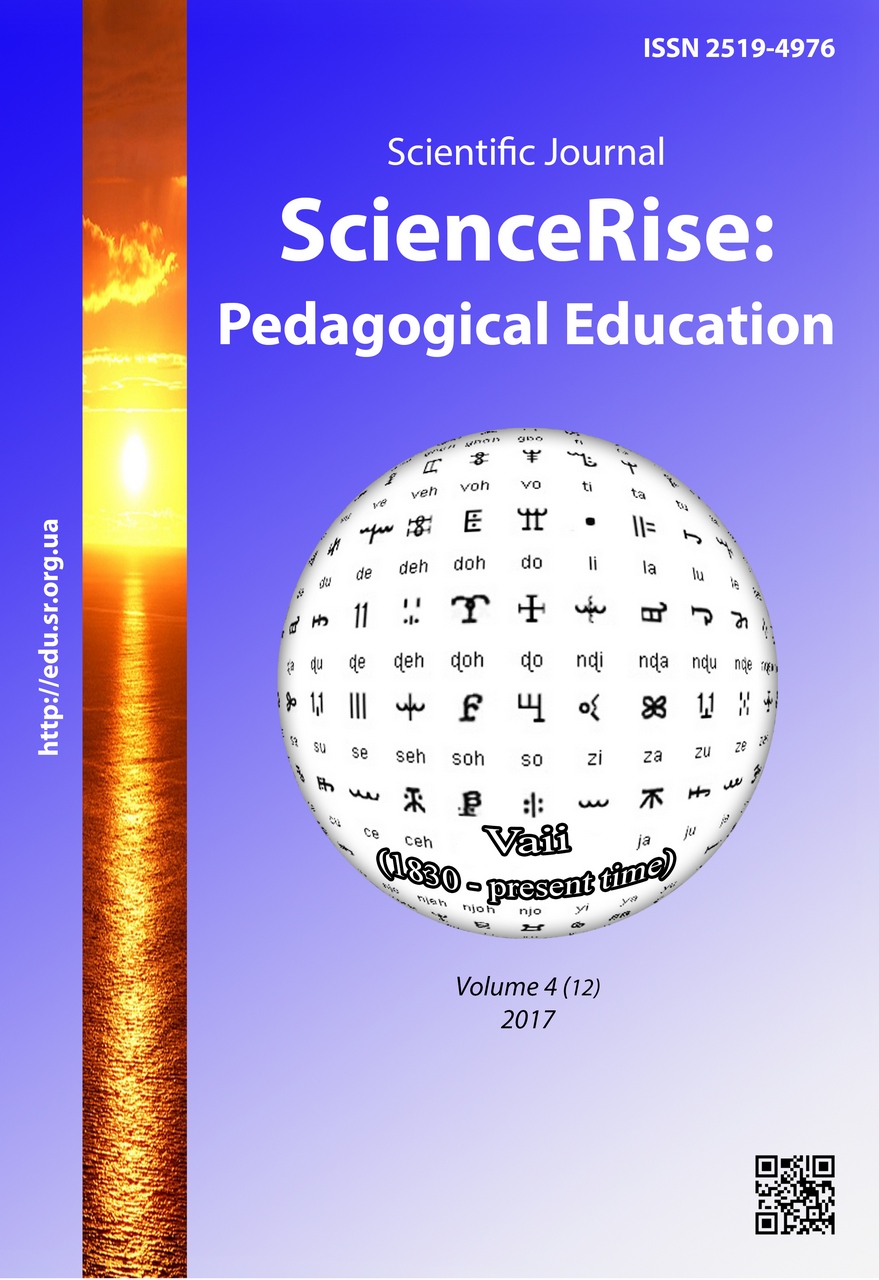Political and economic factors and pre-school education in Poland and Ukraine
DOI:
https://doi.org/10.15587/2519-4984.2017.100505Keywords:
system of education, pre-school education, legislative documents, quantitative and quality changes, political and economic factorsAbstract
In the article the dependence of educational systems of Poland and Ukraine, including the pre-school education, from a political line-up are examined. The author presents basic educational documents, ratified by governments which had an influence on the reorganization of pre-school education: on the changing of types and forms of ownership of pre-school establishments, the change of maintenance of education, as well as the change of approach to the employment of teachers in the pre-school educational institutions. The statistical data has been stored. They showed quantitative changes in Polish and Ukrainian pre-school educational establishments during 2000-2015. It is admitted that concerning changes in Poland and Ukraine have caused the reduction of the amount of pre-school educational establishments, and also the amount of children in them. It is revealed in the research that the downfall tendency in the institutions of pre-school education in the last years has been halted. On the basis of analysis of scientific sources and reference books the author came to the conclusion that on changes in the pre-school establishments of Poland and Ukraine political and economic factors had had an influence
References
- Maszke, A. W. (2008). Metody i techniki badań pedagogicznych, Rzeszów: Wydawnictwo Uniwersytetu Rzeszowskiego, 337.
- Furmanek, W. (2010). Edukacja a przemiany cywilizacyjne. Rzeszów: Wydawnictwo Oświatowe.
- Kotarski, K. (1999). System edukacji narodowej w Polsce. Toruń – Warszawa: Wydawnictwo Adam Marszałek.
- Pęczkowski, R. (2005). Polski system edukacji po reformie 1999 roku. Stan, perspektywy, zagrożenia. Poznań – Warszawa: Dom Wydawniczy Elipsa.
- Dziewulak, D. (1997). Systemy szkolne Unii Europejskiej. Warszawa: Wydawnictwo Akademickie „Żak”.
- Jałmużny, T., Leżańska, W. (Eds.) (2002). Szkolnictwo niepubliczne w Polsce i w Europie w XX wieku. Łódź: Wydawnictwo Wyższa Szkoła Informatyki.
- Pachociński, R. (2000). Współczesne systemy edukacyjne. Warszawa: IBE, 180.
- Nyczkało, N. G., Szlosek, F. (2008). Kształcenie zawodowe w Polsce i Ukrainie – na tle przemian. Warszawa – Radom: Wydawnictwo Naukowe Instytutu Technologii Eksploatacji, 232.
- Ustawa z dnia 7 września 1991r. o systemie oświaty (1991). Dziennik Ustaw, Nr. 95, poz. 425. Available at: https://www.google.com.ua/search?q=Dz.+U.&oq=Dz.+U.&aqs=chrome..69i57j0l5.688j0j7&sourceid=chrome&ie=UTF-8
- Śliwerski, B. (2009). Problemy współczesnej edukacji. Dekonstrukcja polityki oświatowej III RP. Warszawa: Wydawnictwa Akademickie i Profesjonalne, 376.
- Śliwerski, B. (2015). Edukacja (w) polityce. Polityka (w) edukacji. Kraków: Oficyna Wydawnicza „Impuls”, 209.
- Ustawa z dnia 30 sierpnia 2013 r. o zmianie ustawy o systemie oświaty oraz ustawy o zmianie ustawy o systemie oświaty oraz o zmianie niektórych innych ustaw (2013). Dziennik Ustaw, Poz. 1265. Available at: http://isap.sejm.gov.pl/DetailsServlet?id=WDU20130001265
- Ministerstwo Edukacji Narodowej. Available at: https://men.gov.pl/pl/zycie-szkoly/wychowanie-przedszkolne
- Główny Urząd Statystyczny. Mały Rocznik Statystyczny (2000 r., 2003 r., 2005 r., 2008 r., 2010 r., 2013 r., 2015 r.). Available at: http://stat.gov.pl/wyszukiwarka/szukaj.html
- Atlasik, E. (2011). System polityczny Republiki Ukrainy. Available at: http://www.stosunkimiedzynarodowe.pl/system-polityczny-republiki-ukrainy
- Dovidnyk «Oriyentyry vybortsya – 2002» (2002). Laboratoriya zakonodavchykh initsiatyv. Available at: http://www.parlament.org.ua/index.php?action=publication&id=8&ar_id=11&iar_id=316&as=2
- Aleksyeyenko, T. F. et. al.; Kremen, V. H. (2010). Bila knyha natsional'noyi osvity Ukrayiny. Kyiv: Informatsiyni Systemy, 340.
- Kremen, V. H. (Ed.) (2011). Natsional'na dopovid' pro stan ta perspektyvy rozvytku osvity v Ukrayini. Kyiv: Pedahohichna dumka, 304.
- Kremen, V. H. (Ed.) (2001). Osvita Ukrayiny. Kyiv: Milenium, 470.
- Pro doshkil'nu osvitu (2001). Verkhovna Rada Ukrayiny, No. 2628-III. Available at: http://zakon0.rada.gov.ua/laws/show/2628-14
- Hrynevych, L. M. (Ed.) (2013). Zakonodavstvo Ukrayiny u sferi osvity ta profesiynoho navchannya. Kyiv: Parlaments'ke vydavnytstvo, 376.
- Doshkil'na osvita Ukrayiny u 2013 rotsi (2014). Derzhavna sluzhba statystyky Ukrayiny. Kyiv, 89. Available at: https://ukrstat.org/uk/druk/publicat/kat_u/2014/bl/04/bl_bosh_13.zip
- Doshkil'na osvita Ukrayiny u 2014 rotsi (2015). Derzhavna sluzhba statystyky Ukrayiny. Kyiv, 89. Available at: http://www.ukrstat.gov.ua/druk/publicat/kat_u/2015/bl/03/bl_dosh_14.zip
- Osaulenko, O. (2013). Statychnyy shchorichnyk Ukrayiny za 2012 rik. Derzhavna sluzhba statystyky Ukrayiny. Kyiv, 552. Available at: http://library.oneu.edu.ua/files/StatSchorichnyk%20Ukrainy%202012.pdf
- Osaulenko, O. (2014). Statychnyy shchorichnyk Ukrayiny za 2013 rik. Derzhavna sluzhba statystyky Ukrayiny. Kyiv, 534. Available at: http://library.oseu.edu.ua/files/StatSchorichnyk_Ukrainy_2013.pdf
Downloads
Published
How to Cite
Issue
Section
License
Copyright (c) 2017 Michal Hnatiuk

This work is licensed under a Creative Commons Attribution 4.0 International License.
Our journal abides by the Creative Commons CC BY copyright rights and permissions for open access journals.
Authors, who are published in this journal, agree to the following conditions:
1. The authors reserve the right to authorship of the work and pass the first publication right of this work to the journal under the terms of a Creative Commons CC BY, which allows others to freely distribute the published research with the obligatory reference to the authors of the original work and the first publication of the work in this journal.
2. The authors have the right to conclude separate supplement agreements that relate to non-exclusive work distribution in the form in which it has been published by the journal (for example, to upload the work to the online storage of the journal or publish it as part of a monograph), provided that the reference to the first publication of the work in this journal is included.







